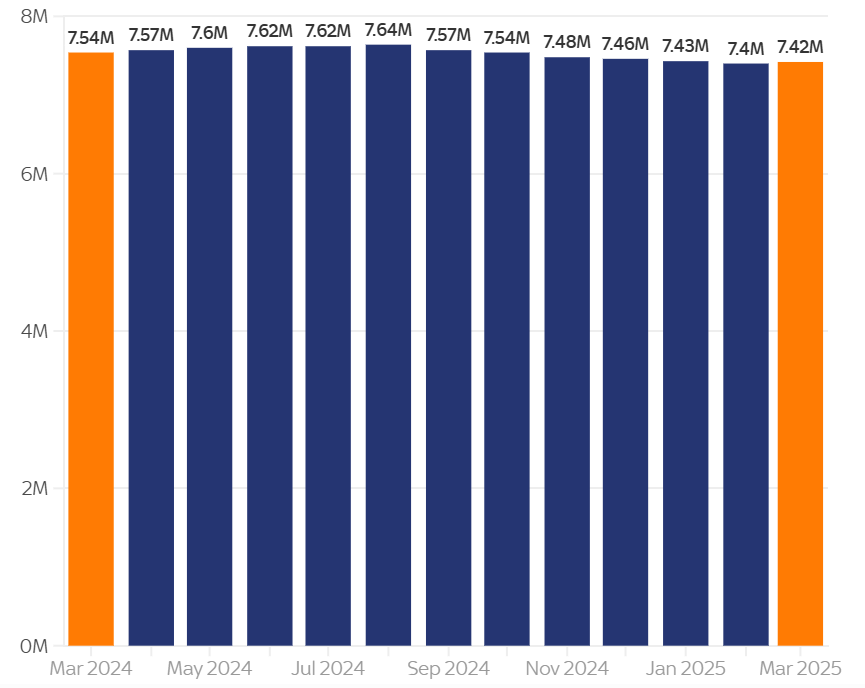Rising NHS Waiting Lists in England
- A.Enes TEKCAN
- May 16, 2025
- 3 min read
Waiting times for routine hospital treatments in England have once again come under the spotlight, as newly released NHS data shows a reversal in the months-long downward trend. At the end of March 2025, the number of patients awaiting care rose to 7.42 million—an increase of more than 18,000 compared to the previous month. This marks the first rise since August 2024, when waiting lists peaked at 7.64 million, and it casts renewed doubt on the government’s ability to bring the healthcare backlog under control.
NHS performance has become a central issue for the current Labour government, which has pledged to be judged on its ability to restore efficiency and accessibility in public health services. In response to the latest figures, Health Secretary Wes Streeting reiterated that the administration inherited a severely strained system but pointed to tangible improvements over the past year, including expanded appointment availability and reductions in long-wait cases, even during winter pressures.
Number of People Waiting for NHS Treatments

However, the recent uptick raises concerns about the achievability of key government targets. The interim objective—ensuring that at least 65% of patients begin treatment or receive a diagnosis within 18 weeks by March 2026—is now viewed as increasingly difficult. The broader ambition of returning to the 92% standard, last met in 2015, appears even more distant.
According to a detailed analysis reported in the Financial Times, health policy experts warn that efforts to deliver sustainable improvements must go beyond political messaging. The government is currently drafting a 10-year plan for the NHS in England, expected later this spring. Yet critics argue that the current draft lacks the bold, transformative policies required to reinvigorate public confidence and meaningfully alleviate service bottlenecks. They stress that ambition must be matched by serious investment, comprehensive reform, and clearly defined implementation pathways—especially as public expectations remain high and the healthcare workforce continues to operate under significant strain.
Strategic Implications for Türkiye’s Health Tourism Sector
The recent increase in NHS waiting lists—rising to 7.42 million patients in March 2025, as highlighted in NHS England data—underscores a deepening access problem in the UK healthcare system. As British citizens face prolonged delays for routine treatments, the immediate consequence is not only patient dissatisfaction but also a growing willingness to seek timely care beyond national borders.
This specific development presents Türkiye with a concrete and time-sensitive opportunity. For patients affected by the NHS backlog—particularly those waiting for procedures that are essential but non-urgent, such as orthopaedic surgeries, oncology diagnostics, fertility assessments, and dental interventions—Türkiye can offer an immediate and high-quality alternative. In many of these areas, Turkish medical institutions have demonstrated both capacity and excellence, often at a fraction of the cost and with waiting times measured in days or weeks rather than months.
Moreover, the demographic most affected by NHS delays includes both working-age adults and elderly patients, many of whom are already accustomed to traveling abroad. Türkiye’s established flight routes with the UK, English-speaking medical staff, and streamlined international patient services create a low-friction experience for these individuals—something that is particularly valuable when delays at home are measured in tens of thousands of cases.
The timing of this spike in NHS delays is also critical. With the UK government under political pressure to meet its interim target of 65% treatment initiation within 18 weeks, and with doubts mounting over its feasibility, patients are likely to take independent action. This behavioural shift—prompted by a specific, measurable service failure—can act as a catalyst for outbound medical travel. Türkiye’s healthcare providers, public and private alike, should view this not as a general trend but as a clearly defined market signal.
To fully leverage this opportunity, Türkiye must focus on visibility and confidence. This includes active outreach to UK-based medical travel coordinators, enhanced digital targeting in regions most affected by NHS backlogs, and transparent communication about clinical quality and legal standards. In the current context, real-world testimonials from UK patients already treated in Türkiye—particularly those who faced long delays at home—can become a powerful marketing and trust-building tool.
This specific rise in NHS waiting lists is not simply a news headline—it is a moment of strategic significance. Türkiye has the infrastructure, expertise, and international positioning to offer British patients a viable and timely solution. By responding to this precise disruption in UK healthcare delivery, Türkiye can reinforce its leadership in global health tourism and translate temporary service failures abroad into sustainable economic and reputational gains at home.




Comments